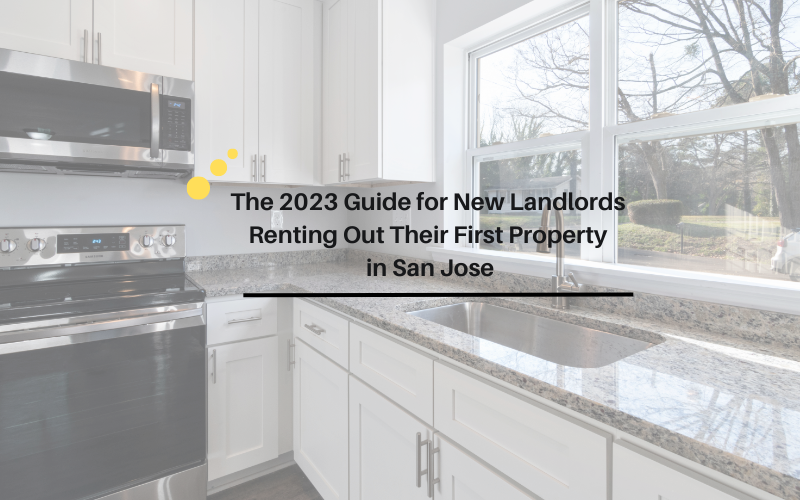Becoming a landlord for the first time and renting out your property can be an exciting yet challenging endeavor. With San Jose’s competitive rental market, it’s essential new landlords educate themselves and follow key best practices to find reliable tenants, comply with local regulations, and achieve success.
This comprehensive guide covers everything you need to know as a new landlord renting your first rental property in San Jose and the Bay Area region.
Set the Right Rental Rates
One of the most important decisions when listing your first rental property is determining an optimal asking rent. Set your rate too low and you leave money on the table. Price it too high and you risk getting no takers and having months of vacancies.
For new San Jose landlords, a smart approach is to research comparable active listings in your area to get a sense of the going market rates for similar units. Resources like Rentometer, Zillow Rent Zestimates, and talking to nearby landlords can help you benchmark. Generally aim to price your unit slightly below similar comparables that have been listed for 30+ days.
You can also factor in metrics like price per square foot and amenities offered. Units with upgrades like modern appliances, outdoor space, and in-unit laundry can often command 10-20% higher rents. Also consider increasing rents minimally year over year through small percentage bumps rather than dramatic spikes to keep pace with the market.
Vet and Screen Prospective Tenants Thoroughly
Finding responsible tenants who pay rent reliably and treat your property with care is crucial for success as a landlord. Be rigorous and discerning in your tenant screening process, especially for your first rental where you don’t have existing income to buffer vacancies.
Require all prospects to complete a detailed rental application that includes their full credit and background check authorization. Verifying income, credit score, past rental history, criminal records, and employment will help you assess applicants.
Set clear standards—for example, requiring a minimum 650 credit score, monthly income of at least 2.5x the rent, strong references, and no recent bankruptcies or evictions. Meet applicants in-person as well before making final decisions.
Also be sure to comply with applicable laws that limit discrimination against protected classes. Focus objectively on tenants’ qualifications rather than demographic characteristics.
Understand Landlord-Tenant Laws and Regulations
San Jose and California have many specific landlord-tenant laws pertaining to security deposits, allowable reasons for evictions, rent control policies, notice requirements, and more. As a new landlord, it’s imperative you understand your key legal rights and responsibilities to avoid issues.
For instance, San Jose has just cause eviction laws restricting when tenants can be forced to vacate. Reasons like missed payments, property damage, or lease violations are permissible—but you cannot evict without proper notice. Local rent control also limits annual rent increases depending on the age and type of property.
Work with an experienced real estate attorney when drafting or reviewing your lease agreement to ensure compliance. Be sure to address issues like security deposits, late fees, maintenance expectations, smoking policies, pets, subletting rules, and termination clauses.
You should also familiarize yourself with state laws, such as limits on security deposits of no more than 2 months’ rent for unfurnished units or 3 months’ rent for furnished units. Know when and how security deposit deductions must be accounted for and returned to tenants upon move out.
Handle Maintenance Requests and Issues Promptly
As a landlord, handling maintenance, repairs, and addressing tenant issues in a timely fashion is legally required and vital for keeping your occupancy stable. Be responsive if tenants report a leaky faucet, faulty appliance, pest problem, or other rental unit issue—these inevitable problems only worsen if neglected.
For minor DIY repairs, assemble a toolkit including basic supplies like tools, spare light bulbs, batteries, caulk, paint, and more. For larger issues beyond your expertise, develop a list of trusted handymen, plumbers, and contractors you can call. Budget and plan for occasional maintenance expenses as part of your costs.
Implement processes for tenants to easily submit maintenance requests, track them, and provide status updates. Automated work order systems and mobile apps can help you manage and document all landlord-tenant communications.
List Vacancies Quickly and Market Your Unit
Even the best tenants eventually vacate, placing the responsibility on you as the landlord to market listings, show the property, screen applicants, and fill vacancies promptly to avoid month-long voids.
As soon as you have notice of an upcoming vacancy, get your unit listed across major rental platforms like Zillow, Trulia, HotPads, and Facebook Marketplace. Targeted sites like Craigslist and NextDoor can also reach local renters. Make use of free listing tools provided by these sites.
Draft compelling listings highlighting amenities, upgrades, appealing unit photos, neighborhood perks, and your ideal tenant profile. Stay on top of monitoring your listings and responding quickly to inquiries to capitalize on interest.
Offer to show your vacant unit on short notice and use smart home technology to enable self-guided tours when possible. The faster you can show, apply, screen, and lease, the shorter your vacancy period will be.
Understand Tax Deductions and Write-Offs for Landlords
A major benefit of owning an income rental property is having access to a wide range of tax deductions and write-offs to reduce your annual tax liability as a landlord. As a new landlord prepping for tax season, educate yourself on tax laws for rental properties.
You can deduct ordinary and necessary expenses like mortgage interest, property taxes, insurance, management fees, maintenance and repairs. Tracking all your rental-related expenses in a ledger throughout the year is wise. Depreciation and amortization of major systems like HVAC can also yield large deductions.
Work closely with your CPA to maximize tax savings through optimal application of deductions, credits, pass-through income, capital vs. ordinary gains, and more. Setting up an LLC or corporation for your rental business can provide additional tax advantages.
Consider Hiring a Property Management Company
For busy new landlords or those without ample time for hands-on management, delegating oversight to a professional property management company is smart. Experienced third-party managers like Intempus Realty can handle tasks like advertising vacancies, showing units, collecting rent, responding to maintenance issues, retaining contractors, and supervising tenants.
While management does involve fees typically between 8-12% of monthly rent, the trade-off is often worth it by reducing demands on your time. Property managers also use their market knowledge to maximize rents and occupancy. Assess whether the convenience and benefits warrant the costs.
Becoming a landlord in San Jose involves learning many nuances of marketing, maintenance, legal compliance, taxes, and tenant relations. But with proper preparation and guidance from a property management partner like Intempus Realty, your first investment property can prove to be a rewarding long-term endeavor. Reach out today to get started!





